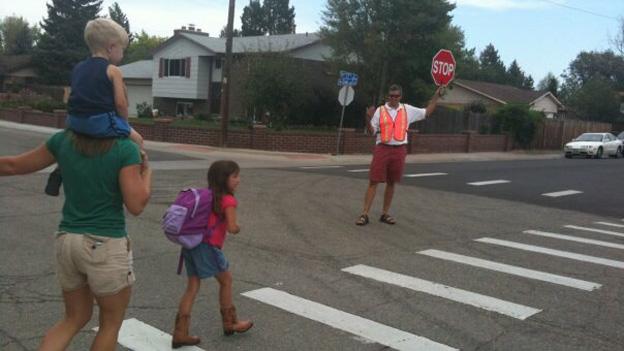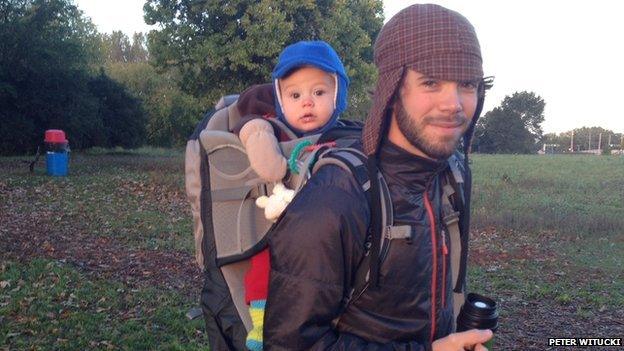What's behind the rise of stay-at-home dads?
- Published

Matt Burr left his job at an online university to care for his two children
A new study by the Pew Research Center shows that the number of dads who choose to stay home and care for their children and families has quadrupled over the past 25 years. Can social and economic factors explain the change?
Make no mistake - fathers who are the primary caregiver for their children are far from the norm. In fact, they are only 16% of all stay-at-home parents. But that number is up from 10% since 1989, when Pew started analysing data. The steady growth since then suggests that these numbers represent a growing trend, not a fad.
"It's up from 1.1 million to 2 million," says Gretchen Livingston, one of the study authors. More significantly, the number of men who say they stay at home specifically to take care of their home and children is at an all-time high, external, more than four times the rate of fathers who gave that same answer in 1989.
"When I first started being a stay-at-home dad I was the only father in New York in Riverside Park," says Jacques Elmaleh, who started staying at home with his children in 2000. "Slowly there were more and more."
In fact, a yearly meeting for Chicago-based stay-at-home dads that started in 1995 has now grown into a national non-profit organisation with 70 chapters across the US and several in Canada.
Through its annual conference and its active social media presence, the group helps dads connect and offers advice on the same types of things about which moms confer - nappy rash, teething pain, and playground politics. They also provide moral support.
"Stay-at-home dads have a unique situation - we don't have role models so we are kind of doing this on our own and trying to figure out how to navigate the relationships that are different than we expected them to be when we first got married," says Al Watts, the president of the National At-Home Dad Network.
As women have taken on more high-paying careers, the assumption that they'll stay home with the children has become less automatic.

In his role as an at-home father, Jacques Elmaleh took on crossing guard duties at his children's school
"My wife and I were earning about the same income at the time just after our daughter was born. We felt that if someone was going to raise our children it would have been one of us," says Watts.
"My wife was promoted shortly after she got back from maternity leave and that bump in pay would allow us to live on one income."
When Matt Burr's son was born, there was never any question as to whether his wife would take time off from her job as a doctor.
"It was a no-brainer in that situation. She was definitely going to have to work," he says.
The question, then, "was whether I kept doing my job." When they crunched the numbers, including the cost of childcare, it made sense for him to stay home.
The rise in stay-at-home dads coincides with a change in social and economic trends regarding women in the workforce, says Farnoosh Torabi, author of When She Makes More.
"We know that before they even get married, women are out-earning and out-learning men," she says, noting that younger women are now getting more degrees and better paying jobs, on average, than men.
In lean economic times staying at home is often a fiscally necessity or the only option for some fathers. Twenty-one percent of fathers cite caring for their family as the main reason they're staying at home, while 23% say they cannot find a job. Forty-seven percent of the men in the Pew survey are living at or below the poverty line, says Reynolds.
The types of jobs that have made a stronger comeback tend to be service-sector, "pink collar" jobs, like healthcare services, retail, and education, that are dominated by women, says Torabi, while well-paying blue collar jobs like manufacturing and construction suffered in the recession.
At the same time, says Watts, men who grew up in households with strict gender divisions want to be more hands-on with their own kids, and are more open to staying at home to do so.

Peter Witucki says moving to a suburban area with less mass transit has made him more isolated
That also makes them more attuned to some of the pitfalls facing working mothers.
"There's a lot in the news about the pay gap for women and challenges for women who take time off to raise kids," says Peter Witucki, who has been at home since the birth of his 14 month old son. "That resonates for me in a new way."
It's a much more nuanced picture then the one painted in broad strokes by the concept of a "Mr Mom" - a title the National At-Home Dad Network has fought hard to eliminate.
"It was a way to describe something very unusual in our culture - a man taking care of children," says Watts. "Today, it's not very unusual, and the simple fact is there is very much better, simpler word to describe a man taking care of children.
"That word is dad."